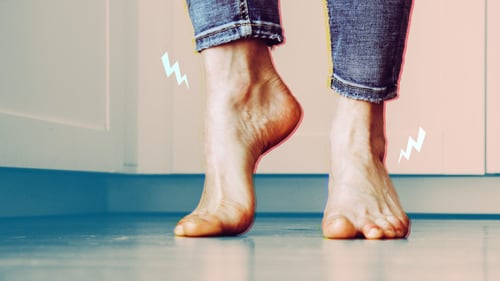Understanding Numb Toes: Common Causes and When to Seek Help

Have you ever stood up, only to realize your toes feel numb or tingly, like they’ve “fallen asleep”? Occasional numbness might not be a big deal, but if it keeps happening or lasts longer than a few minutes, it could be a sign that something more serious is going on. At Sweeney Foot & Ankle Specialists, we often see patients dealing with numb toes and help them get to the bottom of what’s causing it.
Let’s take a closer look at some of the most common causes of toe numbness, and when it might be time to see a foot and ankle specialist.
1. Peripheral Neuropathy
One of the most frequent reasons for numbness in the feet and toes is peripheral neuropathy. This condition happens when the nerves outside your brain and spinal cord are damaged, often causing numbness, tingling, or burning sensations in the toes.
Peripheral neuropathy has a wide range of causes, including diabetes, infections, injuries, or even certain medications. If left untreated, symptoms can worsen over time. According to the Cleveland Clinic, early diagnosis and proper management can help slow its progression and reduce discomfort.
2. Pinched or Entrapped Nerves
Numbness can also happen when a nerve in your foot, ankle, or lower back becomes compressed. Conditions like tarsal tunnel syndrome (similar to carpal tunnel, but in the foot) or sciatica can cause nerve compression that radiates down into the toes.
Sometimes, even wearing tight shoes for long periods or standing for hours can irritate nerves. In more serious cases, like sural nerve entrapment, research from the NIH shows that conservative treatments can help relieve symptoms, but chronic compression may need a specialist’s attention.
3. Diabetes and Poor Circulation
Diabetes is a major contributor to nerve damage and poor circulation in the feet. High blood sugar levels can damage nerves over time, leading to diabetic neuropathy. This often starts with numbness or tingling in the toes and can progress without regular foot care.
Reduced circulation, especially in people with diabetes or vascular disease, can also make it harder for your feet to get the oxygen and nutrients they need—leading to numbness and even slow-healing wounds.
If you have diabetes, staying on top of your foot health is essential. You can learn more about ways to care for your feet in our blog on why diabetic foot care matters.
4. Injuries or Trauma
Have you recently stubbed your toe or injured your foot or ankle? Sometimes, even a mild sprain or repetitive motion injury can affect the nerves and cause lingering numbness. If the sensation doesn’t go away, it’s a good idea to have it checked by a podiatrist.
When Should You See a Specialist?
Occasional numbness might not be urgent, especially if it goes away quickly. But you should see a foot and ankle specialist if:
-
The numbness is frequent or persistent
-
It’s getting worse over time
-
It’s paired with pain, swelling, or weakness
-
You have a history of diabetes or circulation issues
Ignoring these symptoms can lead to more serious problems—especially if an underlying condition like nerve damage or poor circulation is to blame.
Don’t Ignore Numbness. We’re Here to Help.
At Sweeney Foot & Ankle Specialists, we take toe numbness seriously. Our team is experienced in diagnosing the root cause and developing a treatment plan to get you back to feeling your best.
If your toes have been feeling numb, don’t wait. Contact us today to schedule an appointment and find out what’s behind your symptoms.






